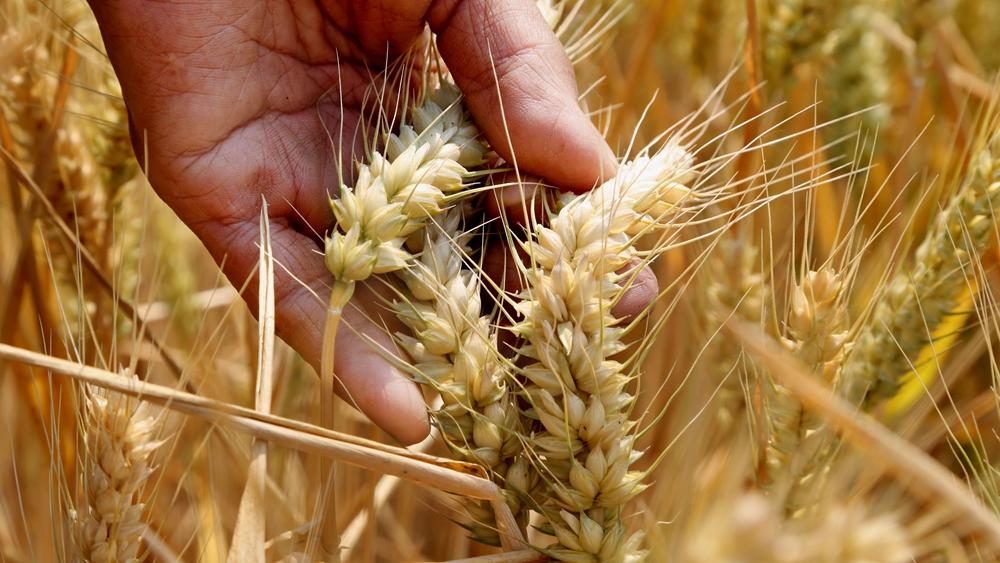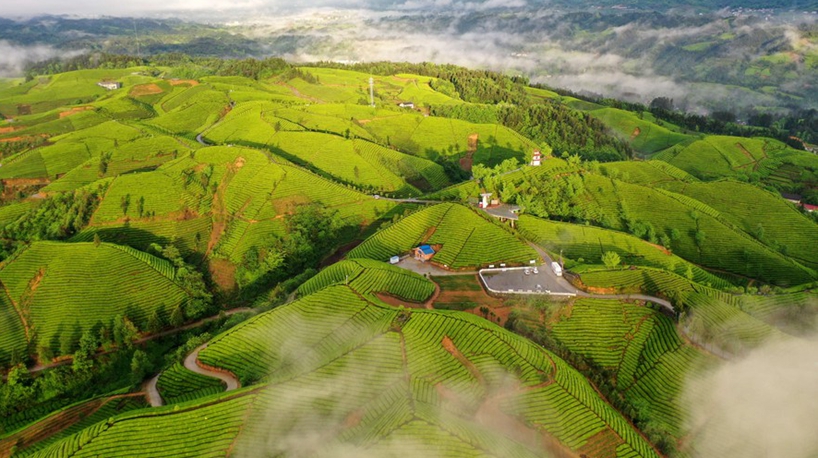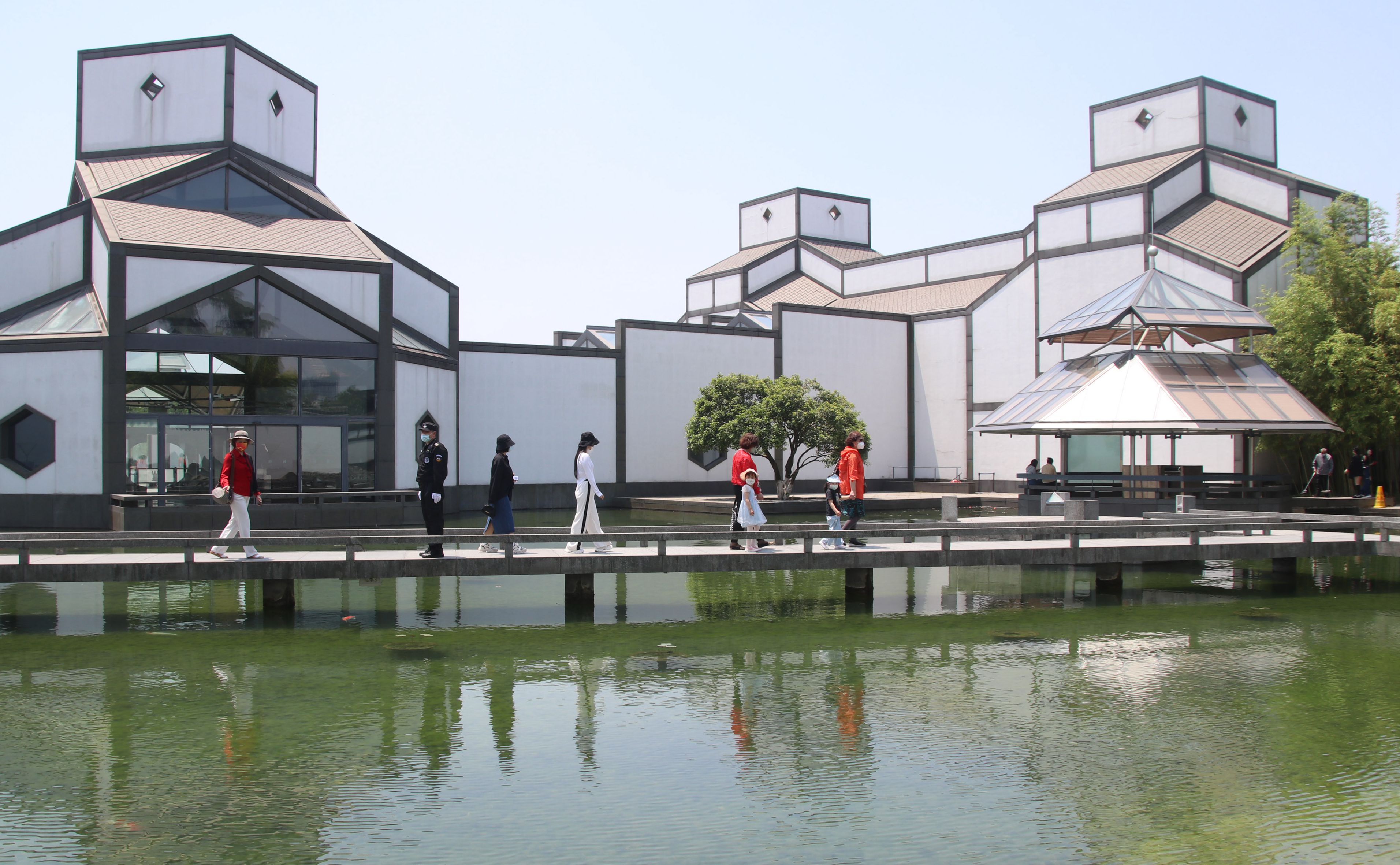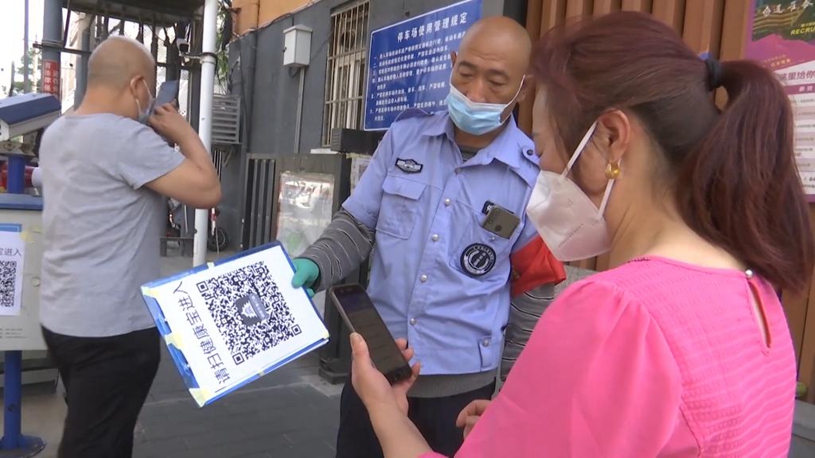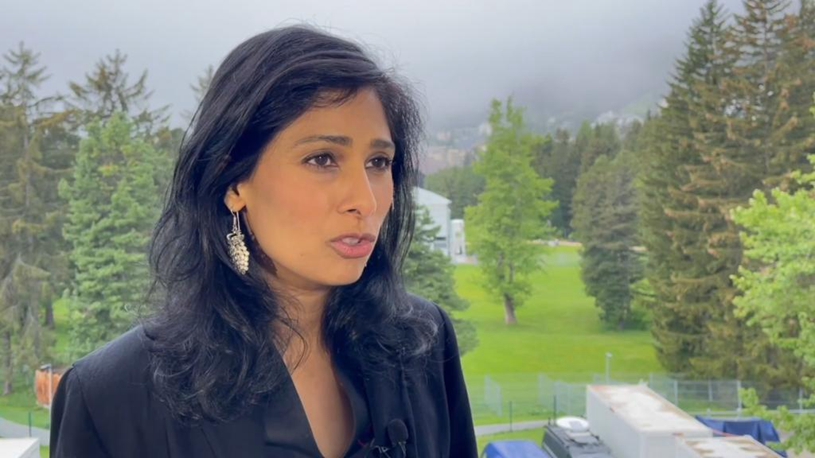* Gulibekge Maiming Reheman is a conservator of the cultural treasure trove of Jiaohe Ruins, the world's biggest and best-preserved relics of a clay-built city in Turpan, Xinjiang.
* Since 1972, Gulibekge's grandfather, father, and now herself have been devoted to the protection of the ancient city of Jiaohe.
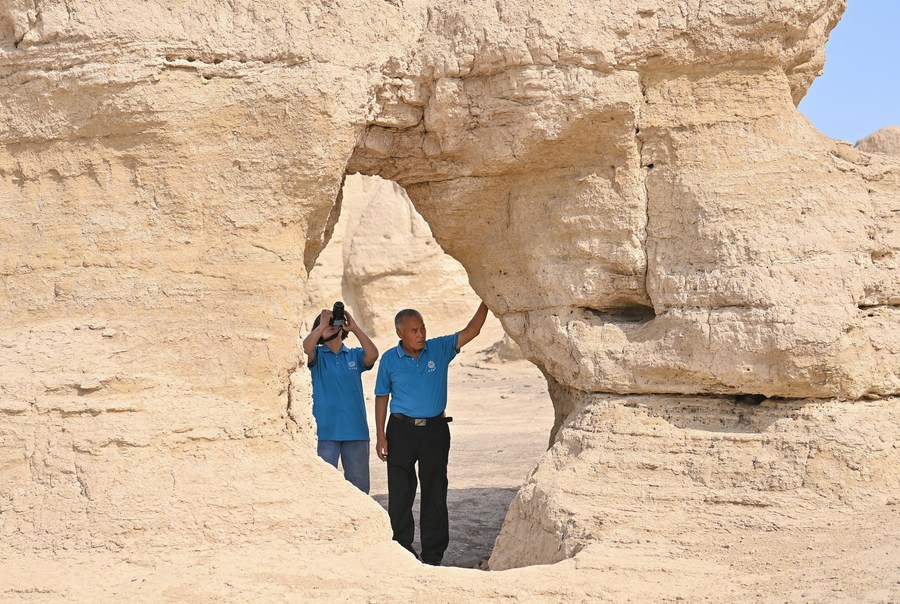
Gulibekge Maiming Reheman (L) and Maiming Reheman patrol at Jiaohe ancient city, Turpan, northwest China's Xinjiang Uygur Autonomous Region, May 20, 2022. (Xinhua/Li Xiang)
by Xinhua writers Yang Hao, Li Xiang, Zhang Xiaolong, Sun Zhennan
URUMQI, May 26 (Xinhua) -- Gulibekge Maiming Reheman is a conservator of the cultural treasure trove of Jiaohe Ruins, the world's biggest and best-preserved relics of a clay-built city in Turpan, northwest China's Xinjiang Uygur Autonomous Region.
Since 1972, Gulibekge's grandfather, father, and now herself have been devoted to the protection of the ancient city of Jiaohe. They have lived, worked and raised their children here, forming a deep bond with this city of over 2,000 years old, while espying the splendid and diverse history and culture of Xinjiang.
CONSERVATOR ON DONKEYBACK
The relationship between the Uygur family and the ancient city began with Gulibekge's grandfather, Reheman Seti.
The village where Reheman Seti lived was only a river away from Jiaohe and nobody realized the value of this ancient city until the arrival of archaeological investigators.
Jiaohe Ruins was not only home to the highest military and political institution in the western region of the Tang Dynasty (618-907) but also houses more than 50 Buddhist sites, all of which have great research value, said Chen Aifeng, assistant dean of Academia Turfanica.
"My father was overjoyed when he learned that the ancient city was drawing a number of domestic and international scholars," said Maiming Reheman, Gulibekge's father.
Maiming Reheman recalled that when his father learned of the Turpan Cultural Heritage Bureau's recruitment drive, he quit his job in the village to become Jiaohe's first cultural relics conservator. As a conservator, his routine work included patrolling around the ancient city, reporting potential dangers that could cause damage to the ruins, and safeguarding the cultural relics of the ancient city from human activities.
Due to the inconvenience of transportation, Reheman Seti often rode a donkey to patrol.
Gulibekge once asked her grandfather why he chose to guard the ancient city despite all the obstacles. His grandfather said he was not particularly educated but was proud to have the opportunity to work in a place with a long history and a reputation both at home and abroad.
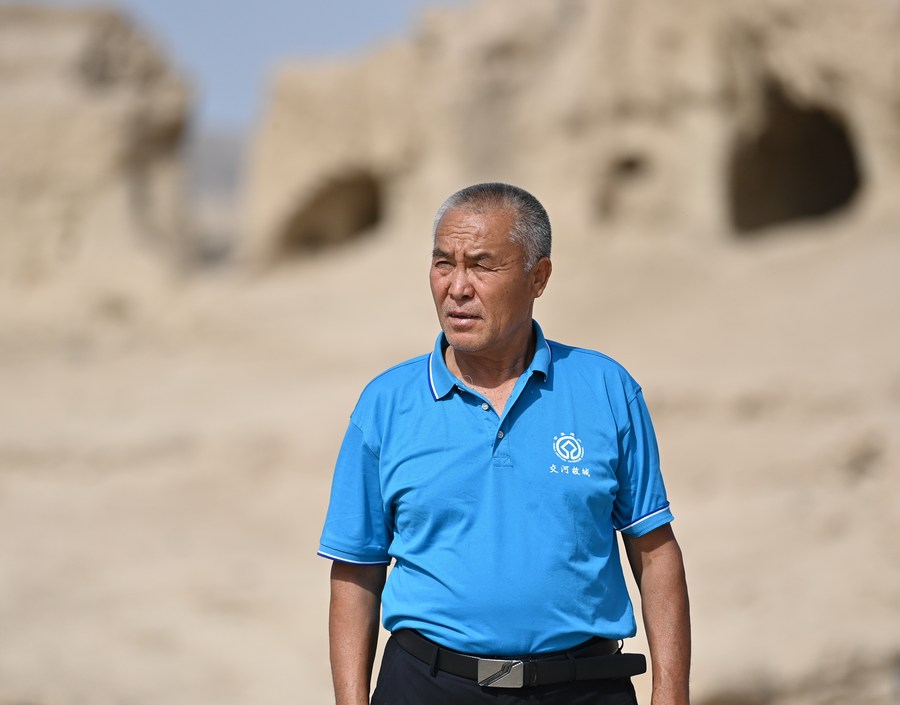
Maiming Reheman patrols at Jiaohe ancient city, Turpan, northwest China's Xinjiang Uygur Autonomous Region, May 20, 2022. (Xinhua/Li Xiang)
GUARDIAN FOR LIFETIME
Reheman Seti retired in 1990 after serving the ancient city for 18 years. His son Maiming Reheman followed in his father's footsteps to become the family's second-generation cultural relics conservator.
Maiming Reheman said that it was through communications with scholars and experts that he developed a deeper understanding of the Jiaohe Ruins. "I have a greater affection for this city after learning more about its history and culture."
Working as cultural relics conservators of Jiaohe Ruins has had a positive impact on the family's fate. Maiming Reheman said that due to this job, he could meet many knowledgeable people, which impelled him to pay greater attention to his daughters' education. Today, four of them are university graduates, with three of them holding master's degrees.
Maiming Reheman is set to retire in two months. He believes that he has formed a strong bond with every living and non-living element here after years of dedicated service. "Even after I retire, I will try my best to protect this place for the rest of my life," he said.
BEST GIFT IN THE WORLD
Gulibekge, the family's third-generation cultural relics conservator in Jiaohe, has been inspired by her grandfather and father. She majored in history and cultural relics protection for her undergraduate and postgraduate studies respectively and returned to her hometown after graduation.
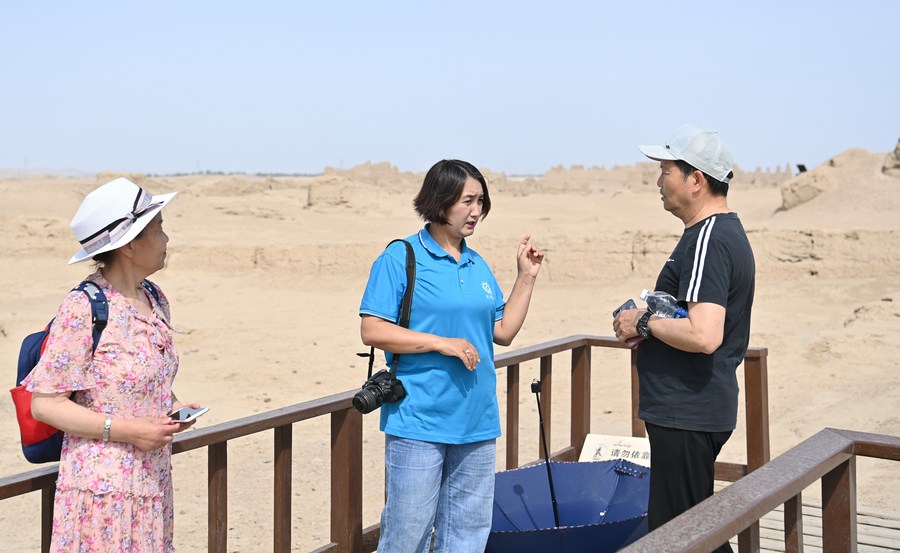
Gulibekge Maiming Reheman (C) introduces Jiaohe ancient city to tourists at the ancient city in Turpan, northwest China's Xinjiang Uygur Autonomous Region, May 20, 2022. (Xinhua/Li Xiang)
"Being able to work on cultural relics protection like my grandfather and father seemed like the best gift in the world," she said.
Unlike the previous cultural relics conservators, the current team is more professional, with better scientific knowledge. Besides gaining the necessary understanding of history and cultural relics protection, Gulibekge and her colleagues are required to take photos during patrols to record the changes in the ancient city in details.
What makes her proud is that in 2014, she was able to participate in the preparation work for Jiaohe's entry into world cultural heritage. She said the moment when the ancient city was successfully listed as a world cultural heritage site will be etched in her heart forever.
"We succeeded! During the celebration, I could only imagine that if my grandfather was still alive, he would be very happy and proud because his hard work had finally paid off," Gulibekge said, as her eyes welled up with tears.
She has also participated in the excavation and protection works of some other cultural relics such as Ya'er Lake Grottoes, another Buddhist site in Turpan.
From 2006 to 2017, four rounds of reinforcement and maintenance work have been carried out successively in the Jiaohe Ruins with a total investment of over 100 million yuan (about 14.9 million U.S. dollars), said Wang Jiandong, director of the cultural relics management institute of the Jiaohe Ruins.
"There are many historical and cultural relics in Xinjiang. I will not only strive to protect these sites as my grandfather and father did but also explore their historical and cultural values," Gulibekge said.
Gulibekge is now the mother of two children. Talking about her expectations for them, she said she hopes that they could have a deeper understanding of Jiaohe because the ancient city is of great significance not just to their hometown but also to the Chinese nation as well as the rest of the world.
"They may not do the same job as me, but they must know the history and culture," she added.
(Video reporters: Yang Hao, Li Xiang, Zhang Xiaolong, Aman, Sun Zhennan; Video editors: Hong Jing, Ming Dajun, Yin Le) ■

